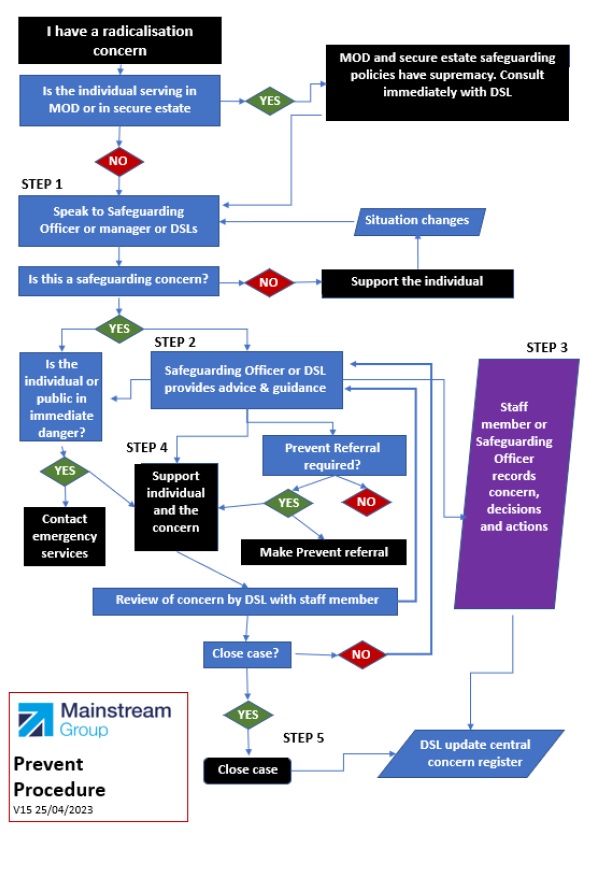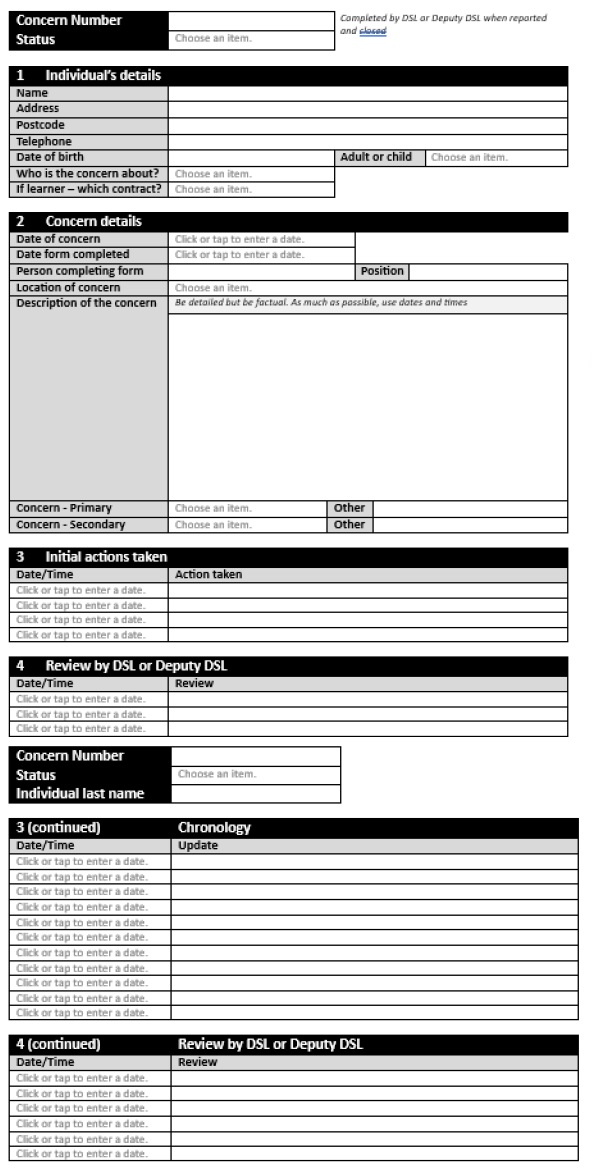Introduction
This Policy is in place for the Mainstream Group which includes Mainstream Training, Mainstream Skills, Mainstream Fleet Services and Mainstream Catering. For any policy to be effective it must be applied throughout Mainstream Group, these policies therefore apply to all employees regardless of position or seniority.
The document is to be read alongside the Safeguarding Policy to direct the behaviour of individuals in a manner that protects everyone’s right to live free from abuse.
The Directors, Department Heads and Designated Safeguarding Lead will monitor the effectiveness of the Policies, which may be changed from time to time to ensure it provides protection, guidance, legislative compliance, and promotes confidence, integrated working, and a caring, accessible, and safe environment.
This policy is our commitment to ensuring all learners, participants, customers and staff are protected from harm or abuse and that any experiencing difficulties will be provided with appropriate support. We believe all adults, young people and children have the right to equal protection from all types of harm or abuse and deserve the opportunity to:
- Gain the maximum benefit possible from good quality education and training
- Be in a safe environment and protected from harm
- Experience emotional well-being
- Be supported by a network of reliable professionals
- Be competent in looking after themselves and coping with everyday living
- Be physically and mentally healthy as possible
- Be protected from online abuse, grooming and radicalisation
Mainstream Group will ensure that all learners and participants on our programmes, and our staff, know how to protect themselves and develop resilience around the risks associated with physical, emotional, and sexual abuse and harassment, radicalisation, extremism, forms of abuse, grooming and bullying – including through the use of the internet. Mainstream will provide services to support learners and participants to feel safe in centres, online, at home and within society.
If you have any questions regarding this document and how it applies to you, including how to request access to your personal data please contact designated Director, markgmsmith@recruitandtrain.com.
Related Policies
- Safeguarding Policy
- Safer recruitment policies – must be followed in the appointment of all staff.
- Site Access policies must be followed for the security of all staff and learners
Definitions & Terms / Roles & Responsibilities
Policy Statement
This policy is designed to help us challenge extremist views to help protect our learners, staff and the public from potential harm. As such, the Prevent and Protect agendas will be addressed as a safeguarding concern and therefore this policy is based on the same five principles as our safeguarding policy and procedures:
- It Is everyone’s right to live free from abuse.
- Priority is given to the prevention of abuse by raising awareness of safeguarding and by fostering a culture of vigilance around safeguarding issues.
- Identification of concern that anyone who is suspected of, or subjected to abuse, or mistreatment, will be addressed immediately.
- Safeguarding is a multi-agency responsibility, and we expect all partners to actively work together to provide safe places, people, and services.
- Mainstream Group will ensure that all suspicions, allegations, and incidents are taken seriously, responded to quickly and appropriately.
The specific purpose of this policy is to:
- Ensure an awareness of Prevent within Mainstream
- Provide a framework to inform our response safeguarding concerns including a referral process for those who may be susceptible to messages of extremism
- Embed British Values into the curriculum and ways of working
- Recognise current practice which contributes to the Prevent and Protect agendas
- Identify areas for improvement
However, we will endeavour to incorporate the relevant duties so as to not
- Stifle legitimate discussions or debate, or
- Stereotype, label or single out individuals based on their origins, ethnicity, faith and beliefs or any other characteristics protected under the Equality Act 2010
Mainstream Group offers a broad range of activities and programmes for learners. As well as responding to immediate concerns, we will ensure that appropriate measures and practices are in place to promote the welfare and safeguarding of learners. All learners and staff have the right to live and work in an environment that is safe and healthy.
When providing a subcontracted service and our learners or service users are therefore also learners or service users of that organisation, safeguarding incidents will be shared with the prime contractor.
Policy Supremacy: Mainstream delivers some services on other agency sites; for example, Ministry of Defence and Ministry of Justice. Where safeguarding concerns arise in those settings, their policies and procedures will have supremacy over Mainstream, however we will continue to record concerns in our own systems and will report radicalisation concerns through local civilian Channel and referral processes.
Relevant Legislation and Guidance:
This Prevent policy and procedures is written with reference to are rooted in the following:
- Prevent Duty set out in Section 26 of the Counter Terrorism and Security Act 2015 and guidance for Further Education providers
- Terrorism Act 2000, 2006, 2008
- Protect Duty and guidance for education providers
- Equality Act 2010
Background Information
Radicalisation – Abusees may show signs of being more intolerant of moderate views, increasingly extreme regarding another section of society or government policy, may express a desire or intent to take part in extremist activity, may be observed downloading viewing or sharing extremist propaganda, become withdrawn and focused on one ideology, their appearance may change (eg clothes, tattoos and emblems), may become secretive and may become isolated from friends and family.
Concerns that an individual may be vulnerable to radicalisation does not mean that you think the person is a terrorist; it means that you are concerned that they are prone to being exploited by others. The Prevent referral programme ‘CHANNEL’ has been set up by the Government and incorporates a multi-agency approach to support individuals at risk of radicalisation, namely pre-criminal activity, by:
- Identifying individuals at risk
- Assessing the nature and extent of that risk
- Developing the most appropriate support plan for the individual(s) concerned.
Mainstream staff have an obligation to refer to the DSL if they identify an individual that they believe may be vulnerable to being drawn into terrorism. Or if they believe they may be accessing extremist content, displaying changes in behaviour, or be suspected of being groomed or radicalised in centre, online or at home.
Prevent is one of the four strands of the Government’s counter terrorism strategy – CONTEST. The UK faces a range of terrorist threats and terrorist groups who pose a threat to the UK seek to radicalise and recruit people to their cause. Therefore, early intervention is at the heart of Prevent which aims to divert people away from being drawn into terrorist activity. The national Prevent Duty confers mandatory duties and responsibilities on a range of public organisations including training providers, and seeks to:
- Respond to the ideological challenge of terrorism and the threat we face from those who promote it.
- Prevent people from being drawn into terrorism and ensure that they are given appropriate advice and support;
Work with a wide range of sectors (including education, criminal justice, faith, charities, the internet and health).
The company will monitor and evaluate learner groups, contractors, clients and customers. The company will not work with extremist groups in any capacity. The company will carefully evaluate the credibility of those we support, train, contract and supply.
Protect, or Martyn’s Law, is intended to keep people safe, enhancing national security and reducing the risk to the public from terrorism by the protection of public venues. It places a requirement on those responsible for certain locations to consider the threat from terrorism and implement appropriate and proportionate mitigation measures. The legislation will ensure parties are prepared, ready to respond and know what to do in the event of an attack. Better protection will be delivered through enhanced security systems, staff training, and clearer processes. Premises will fall within the scope of the Duty where “qualifying activities” take place; this includes education. Eligible locations whose maximum occupancy meets the above specified thresholds are drawn into specific tier of action.
Mainstream links with UK Armed Forces. Mainstream delivers driver training to the UK Armed Forces from MOD sites. The board of Mainstream recognises that this relationship has the potential to make a Mainstream learning site a soft target for extremist activity.
Implementation
- Teaching and learning. We will provide a curriculum that promotes British Values, knowledge, skills and understanding to build resilience of learners. We will do this through:
- Embedding British Values, equality, diversity and inclusion, wellbeing and community cohesion
- Promoting wider skills development such as confidence, communication, motivation and teamwork
- Encouraging active participation and learner voice
- Learner support. We will ensure staff take preventative and responsive steps. We will do this through:
- Anti-bullying strategies and challenging discriminatory behaviour
- Recognising factors that may increase risk to a learner
- Ensuring staff and learners know how to access support in Mainstream
- Supporting at risk learners through safeguarding and crime prevention processes
- Working collaboratively to promote support for students across all areas of Mainstream
- Management of risk and respond to events. We will assess and monitor risks and be ready to deal appropriately with issues which arise through:
- Maintain linked with the Department for Education FE & HE Prevent Coordinators
- Understanding the nature of the national and local threat from radicalisation and violent extremism
- Responding appropriately to events reported via local, national or international news that may impact leaners and communities
- Ensuring plans are in place to minimise the potential for acts of violent or non-violent extremism within Mainstream sites
- Continuously developing effective ICT security and responsible user policies
- Ensuring measures are in place to respond appropriately to a threat or incident within a Mainstream site
- Management of concerns. We will manage any concerns about radicalisation and extremism as safeguarding concerns in line with the procedures set out in the Prevent Procedure. Where a Prevent referral is necessary because there is concern a person is vulnerable to radicalisation, the local referral process for assessment and multi-agency Channel Panels will be followed.
- National police Prevent advice line – 0800 0113764
- Kent and Medway – Refer someone to the Prevent Team | Kent Police
- Yorkshire and Humber – PREVENT: Yorkshire & Humber Regional Organised Crime Unit (yhrocu.org.uk)
- Wiltshire – Refer someone to the Prevent Team | Wiltshire Police
- Devon and Cornwall – Refer someone to the Prevent Team | Devon & Cornwall Police (devon-cornwall.police.uk)







